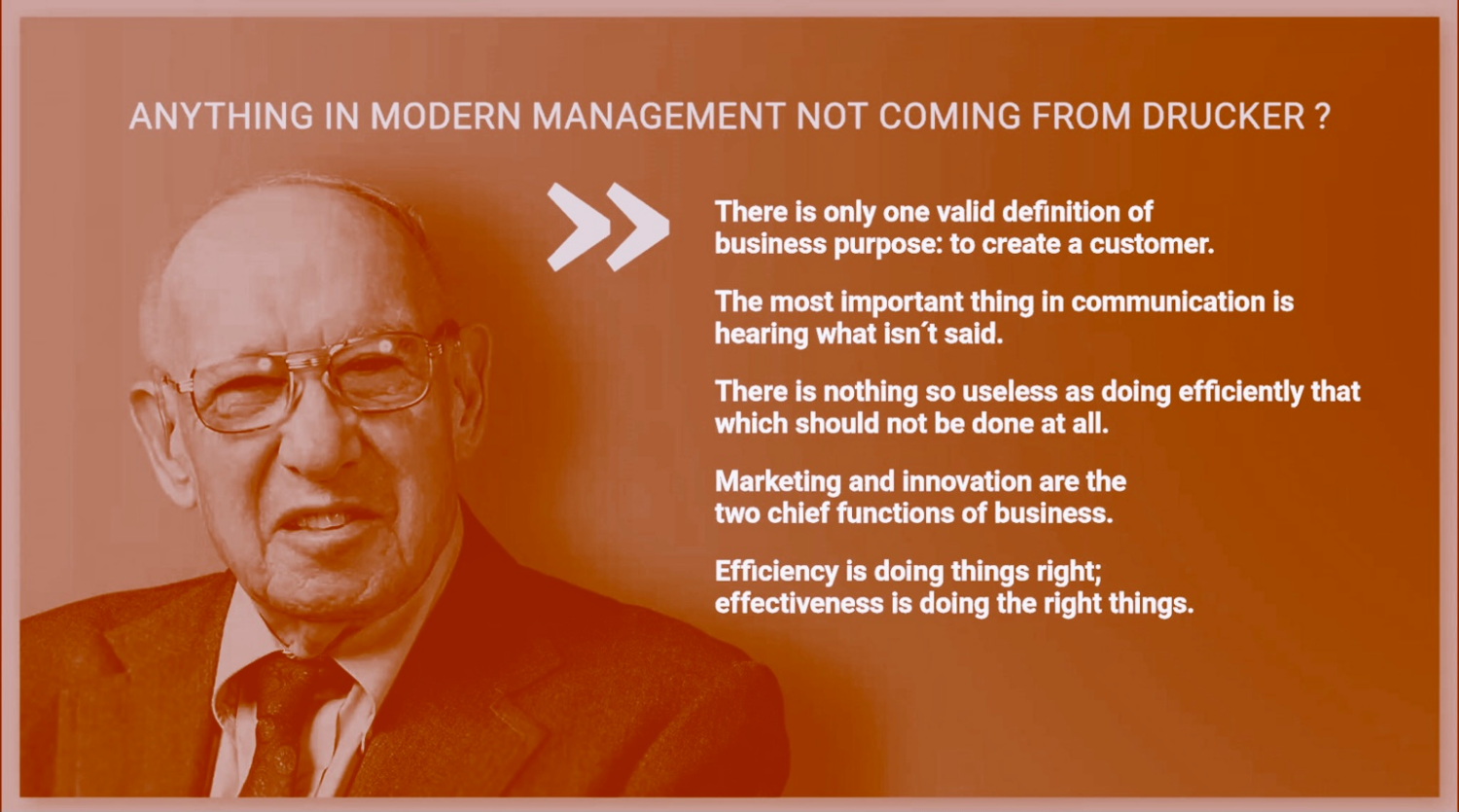Inside Drucker’s Brain – Die Wahrhaftigkeit des Managements
Peter F. Drucker (1909 – 2005) ist für mich Vorbild.
Seine Ideen und Gedanken sind die Vorlage für alle anderen Managementbücher. Ich sage oft: „Mehr, als Drucker muss man nicht gelesen haben“.
Drucker verkörpert das wahre Wesen des Managements. Drucker lebte ein Leben, das darauf basierte, das Morgen zu umarmen und das Gestern aufzugeben. Dabei entdeckte er ein wichtiges Paradoxon: Um etwas aufzubauen, muss man es niederreißen. Drucker hatte kein Problem damit, Dinge niederzureißen, das aufzugeben, was nicht funktioniert hat, und das zurückzulassen, was nicht mehr wichtig ist. Nur so konnte er so viel erreichen.
Im Prinzip ist es auch das, worum es beim Interim Management geht und das spiegelt sich auch in meinem Claim wider: BEWEGEN | VERÄNDERN | VERBINDEN
Ende 2003 lud der 94-jährige Peter F. Drucker den Autor Jeffrey A. Krames zu einem ganztägigen Interview zu sich nach Hause ein. Er sprach offen über seine bahnbrechenden Managementprinzipien, sein enormes Werk (38 Bücher über sechs Jahrzehnte) und die Führungskräfte, die er über die Jahre beraten hat (z.B. Jack Welch).
Es dauerte viele Monate, bis Krames das mehr als sechsstündige Interview abgeschrieben hatte, aber er brauchte Jahre, um es zu verarbeiten.
.
Ich empfehle allen, das Buch von Jeffrey A. Krames zu lesen: „Inside Drucker’s Brain“ gibt Leser*innen eine neue Sicht auf die Denkmuster dieses außergewöhnlichen Vordenkers.
Hier gibt es Textausschnitte und Zitate aus dem Buch zu lesen:.
“Management is doing things right. Leadership is doing the right things.”
The born Manager
- can place people
- can hire or fire people without getting emotionally upset
- decides priorities
One of Drucker’s prescient business tenets is: „AlI development is self-development.“ This means that it is every individual’s responsibility to do whatever is necessary to gain the mind-set, training, and initiative to grow professionally. The key is to do that by focusing on strengths. Here are seven ideas on how to do that, excerpted directly from Drucker’s writings:
- List your major contributions over the last two to three years.
- Make a list of the four to six specific tasks and responsibilities that you are most accountable for at your company.
- Ask for the most demanding assignments.
- Examine the best in yourself before searching out the best in others.
- Do not fear strong colleagues or ambitious subordinates.
- Don’t resent talent-surround yourself with the best.
- Become a genuine doer and do not waste energy putting others down.
“Don’t tell me what you are doing. Tell me what you stopped doing.”
THE CRITICAL FACTORS
Just as there are “no leadership qualities,” there is no one critical factor. „Leadership is doing the right things,“ and that entails many factors. We do know that Drucker’s ideal leader had the following traits and habits:
- Possesses character and courage: these are two of the most fundamental characteristics of a leader.
- Creates a clear mission: a leader paints a clear picture of the finish line.
- Installs loyalty: a leader understands that loyalty is a two-way street.
- Focuses on strength: a leader makes “strengths effective and weaknesses irrelevant”
- Does not fear strong subordinates: their successes are your successes.
- Is consistent: leadership is not a function of being clever, it is based on consistency.
- Develops tomorrow’s leaders: the best leaders understand that it is their responsibility to develop leaders who will guide their organization in the years ahead.
“No institution can possibly survive if it needs geniuses or supermen to manage it.”
“In the modern corporation, the problem of leadership is not only more important than in other institutions, it is far more difficult. The modern industrial enterprise needs many more leaders than institutions, and of high quality. At the same time, it does not automatically produce leaders either in sufficient numbers or of sufficient quality and experience. Leadership cannot be created or promoted. It cannot be taught or learned … management cannot create leaders. It can only create the conditions under which potential leadership qualities become effective; or it can stifle potential leadership.”
The three officers’ rule:
A responsible CEO should identify, within three years of accepting the position, and have available at least three candidates equal or better than himself who can succeed him should the need arise.
“Any business enterprise has two — and only these two — basic functions: marketing and innovation.”
Leaders subordinate themselves to the task, but don’t identify themselves with the task. The task remains both bigger than they are, and different. The greatest indictment of a leader is that the organization falls apart the day he or she leaves. „He or she hasn‘t built. They may have been effective operators, but they have not created vision”. Leaders must learn to become servants to whatever task the organization needs to perform.
“Without a decision maker you’ll never make a decision.”
Life-and-death Decisions:
There are no decisions more important than people decisions. Drucker never forgot the lessons he had gleaned from Alfred Sloan. “Executives spend more time on managing people and making people decisions than on anything else—and they should,” insisted Drucker. “No decision is as long lasting in its consequences or as difficult to unmake. He added that most executives make bad people decisions, with a batting average no better than 0,333: one third of new hires are good ones; one third are “minimally effective,” and one third are disasters.
.
Source: Peter Drucker Society
Obsess over Customers:
“It is the customer who determines what a business is. For it is the customer, and he alone, who through being willing to pay for a good or a service, converts economic resources into wealth, things into goods. What the business thinks it produces is not of first importance— especially not to the future of the business and to its success. What the customer thinks he is buying, what he considers value/ is decisive—it determines what a business is, what it produces and whether it will prosper. The customer is the foundation of a business and keeps it in existence. He alone gives employment.“
On the information revolution (1999):
“The truly revolutionary impact of the Information Revolution is just beginning to be felt. But it is not ‘information’ that fuels this impact. It is not artificial intelligence.’ It is not the effect of computers … on decision-making policymaking, or strategy. It is something that practically no one foresaw, or even talked about ten or fifteen years ago—that is, the explosive emergence of the Internet as a major, perhaps eventually the major, worldwide distribution channel for goods, for services, and, surprisingly, for managerial and professional jobs. This is profoundly changing economies, markets and industry structures; products and services and their flows; consumer segmentation, consumer values, and consumer behaviour; jobs and labour markets. But the impact may be even greater on societies and politics, and, above all, on the way we see the world and ourselves in it.”
“BUSINESS ALONE IS DESIGNED TO INNOVATE. No business will long survive, let alone prosper, unless it innovates successfully.”
What Will Our Business Be? (Mid-1950s):
“The customer is the foundation of the business and keeps it in existence. “Because its purpose is to create a customer any business enterprise has two—and only these two—basic functions: marketing and innovation. They are the entrepreneurial functions.
The lesson is, don’t wait to innovate. Innovate outside the existing organisation. You may set up an innovation kindergarten. The key is to make sure to organize for innovation. If you don’t look out the window, you won’t see it. Tomorrow always arrives. It Is always different. And then even the mightiest company is in trouble if it has not worked on the future. It will have lost distinction and leadership. (Long before Grove’s “strategic inflection point” and Christensen’s “disruptive technology” became parts of the business lexicon, there was Peter Drucker, warning of similar Perils but using less lofty terms).
Und zu guter Letzt äußerte sich Drucker auch zu seinem Beruf als Consultant (er hatte nie eine operative Managementaufgabe inne):..
.
“The clients pay for the consultant’s mistakes.”
.
.
Quelle: Jeffrey A. Krames: Inside Drucker’s Brain, Portfolio Hardcover (2008).
.
.
Hier geht es zur Leseprobe:
ICH UNTERSTÜTZE SIE AUF IHREM WEG
Als Stratege, Innovator und Macher tue ich die richtigen Dinge schneller richtig.
Gerne auch für Sie.
Gemeinsam können wir neue Marktchancen entdecken, das Produktbranding in die richtige Richtung lenken, Ihre Kunden besser verstehen – und sich von der Konkurrenz mit für die Zielgruppe maßgeschneiderten Produkten abheben. All das führt zu mehr Kundenzufriedenheit, einem größeren Kundenwert („Customer Lifetime Value“) und mehr Umsatzpotenzialen.
Können Sie es sich leisten, darauf zu verzichten?










